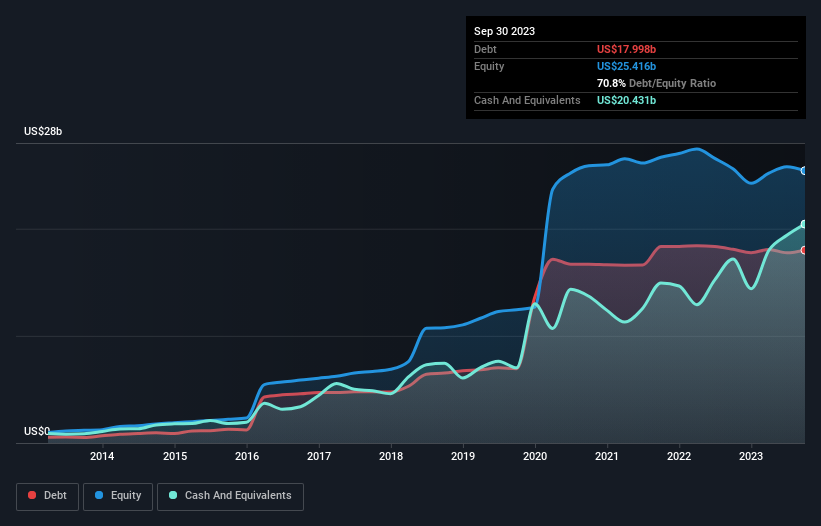
Some say volatility, rather than debt, is the best way to think about risk as an investor, but Warren Buffett famously said that 'Volatility is far from synonymous with risk.' So it might be obvious that you need to consider debt, when you think about how risky any given stock is, because too much debt can sink a company. We can see that Centene Corporation (NYSE:CNC) does use debt in its business. But the real question is whether this debt is making the company risky.
What Risk Does Debt Bring?
Debt is a tool to help businesses grow, but if a business is incapable of paying off its lenders, then it exists at their mercy. Ultimately, if the company can't fulfill its legal obligations to repay debt, shareholders could walk away with nothing. However, a more usual (but still expensive) situation is where a company must dilute shareholders at a cheap share price simply to get debt under control. Of course, plenty of companies use debt to fund growth, without any negative consequences. When we think about a company's use of debt, we first look at cash and debt together.
View our latest analysis for Centene
What Is Centene's Debt?
The chart below, which you can click on for greater detail, shows that Centene had US$18.0b in debt in September 2023; about the same as the year before. But it also has US$20.4b in cash to offset that, meaning it has US$2.43b net cash.

How Strong Is Centene's Balance Sheet?
We can see from the most recent balance sheet that Centene had liabilities of US$36.9b falling due within a year, and liabilities of US$22.1b due beyond that. Offsetting this, it had US$20.4b in cash and US$15.5b in receivables that were due within 12 months. So its liabilities outweigh the sum of its cash and (near-term) receivables by US$23.1b.
While this might seem like a lot, it is not so bad since Centene has a huge market capitalization of US$39.6b, and so it could probably strengthen its balance sheet by raising capital if it needed to. However, it is still worthwhile taking a close look at its ability to pay off debt. While it does have liabilities worth noting, Centene also has more cash than debt, so we're pretty confident it can manage its debt safely.
Also good is that Centene grew its EBIT at 14% over the last year, further increasing its ability to manage debt. There's no doubt that we learn most about debt from the balance sheet. But it is future earnings, more than anything, that will determine Centene's ability to maintain a healthy balance sheet going forward. So if you're focused on the future you can check out this free report showing analyst profit forecasts.
Finally, while the tax-man may adore accounting profits, lenders only accept cold hard cash. While Centene has net cash on its balance sheet, it's still worth taking a look at its ability to convert earnings before interest and tax (EBIT) to free cash flow, to help us understand how quickly it is building (or eroding) that cash balance. Over the last three years, Centene actually produced more free cash flow than EBIT. That sort of strong cash generation warms our hearts like a puppy in a bumblebee suit.
Summing Up
While Centene does have more liabilities than liquid assets, it also has net cash of US$2.43b. The cherry on top was that in converted 145% of that EBIT to free cash flow, bringing in US$5.5b. So we don't have any problem with Centene's use of debt. Of course, we wouldn't say no to the extra confidence that we'd gain if we knew that Centene insiders have been buying shares: if you're on the same wavelength, you can find out if insiders are buying by clicking this link.
When all is said and done, sometimes its easier to focus on companies that don't even need debt. Readers can access a list of growth stocks with zero net debt 100% free, right now.
New: AI Stock Screener & Alerts
Our new AI Stock Screener scans the market every day to uncover opportunities.
• Dividend Powerhouses (3%+ Yield)
• Undervalued Small Caps with Insider Buying
• High growth Tech and AI Companies
Or build your own from over 50 metrics.
Have feedback on this article? Concerned about the content? Get in touch with us directly. Alternatively, email editorial-team (at) simplywallst.com.
This article by Simply Wall St is general in nature. We provide commentary based on historical data and analyst forecasts only using an unbiased methodology and our articles are not intended to be financial advice. It does not constitute a recommendation to buy or sell any stock, and does not take account of your objectives, or your financial situation. We aim to bring you long-term focused analysis driven by fundamental data. Note that our analysis may not factor in the latest price-sensitive company announcements or qualitative material. Simply Wall St has no position in any stocks mentioned.
About NYSE:CNC
Centene
Operates as a healthcare enterprise that provides programs and services to under-insured and uninsured families, commercial organizations, and military families in the United States.
Very undervalued with solid track record.

